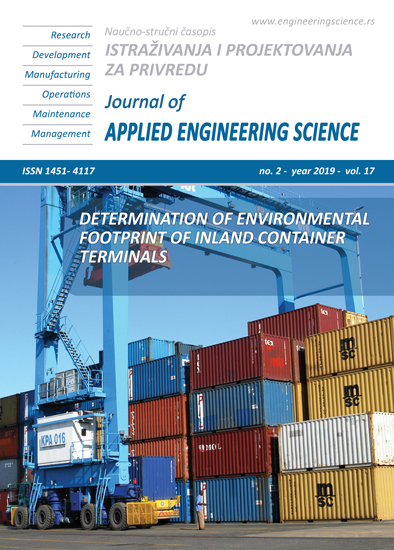EVALUATION OF DRIVER’S ECO-DRIVING SKILLS BASED ON FUZZY LOGIC MODEL – A REALISTIC EXAMPLE OF VEHICLE OPERATION IN REAL-WORLD CONDITIONS
Abstract
It is well known that fuzzy logic is a processing tool in circumstances lacking of clear linguistic information, as well as making conclusions based on imprecise assertions and rough data. Eco-driving rules that the drivers should comply with are not always made of concrete values (exact acceleration / deceleration rates, torque or headway / distance kept from the vehicle ahead, etc.), but often linguistically expressed and subjective (e.g. soft acceleration, mid-range engine speed, soft deceleration, sufficient distance, etc.). Therefore, the authors recognized fuzzy logic potentials as an efficient tool to overcome all mentioned barriers and thus to increase vehicle energy eficiency and reduce emissions of harmful gases which are main goals of eco-driving. The primary objective of this paper is to raise the awareness on the potentials and efficiency of fuzzy logic systems’ use in eco-driving as a tool for achieving more ecologically & economically sustainable road transport. The rules that drivers should follow in order to achieve and maintain eco-driving goals, as well as the parameters to be monitored to evaluatedriver’s behaviour i.e. the compliance with eco-driving rules are presented in the paper. The authors propose a driver rating system based on the fuzzy logic model constructed within MatLab. Within the proposed model the input parameters are actual acceleration/deceleration rates, engine speed and accelerator pedal pressure(APP) and while model output are driver ratings (scores ranging from 0 to 10 points) after completed a driving cycle. A real-world example based on data collected via vehicle OBDII connector by a TEXA logging device in realistic vehicle operation conditions. The consequent actual results of drivers’ behaviour rating tool based on the proposed model are presented in the paper.
References
/1/ Araujo, R., Igreja, A., de Castro, R., Araujo, R. E., (2012) Driving Coach: a Smartphone Application to Evaluate Driving Efficient Patterns,in Proceedings of2012 Intelligent Vehicle Symposium, Spain1005-1010
/2/ Barkenbus, J.N., (2010) Eco-driving: An overlooked climate change initiative, Energy Policy, 38(2), 762-769
/3/ Beloufa, S., Cauchard, F., Vedrenne, J., Vailleau, B., Kemeny, A., Merienne, F., Boucheix, J. M., (2017) Learning eco-driving behaviour in a driving simulator: Contribution of instructional videos and interactive guidance system, Transportation Research Part F, https://doi.org/10.1016/j.trf.2017.11.010
/4/ Beusen, B., Broekx, S., Denys, T., Beckx, C., Degraeuwe, B., Gijsbers, M., Scheepers, K., Govaerts, L., Torfs, R., Panis, L. I., (2009) Using on-board logging devices to study the longer-term impact of an eco- driving course, Transportation Research Part D, 14(7), 514-520
/5/ Chou, W-Y., Lin, Y-C., Lin, Y-H., Chen, S-Y., (2012) Intelligent eco-driving suggestion system based on vehicle loading model, in Proceedings of 12th International Conference on ITS Telecommunications, 558-562
/6/ Cvetković, M., Momčilović V., Dimitrijević, B., (2015) Performance Indicators For Professional Drivers’ Evaluation In Supply Chain,in Proceedings of 2nd Logistics International Conference LOGIC 2015, Belgrade, Serbia, 253-258
/7/ Díaz-Ramirez, J., Giraldo-Peralta, N., Flórez-Ceron, D., Rangel, V., Mejía-Argueta, C., Huertas, J. I., Bernal, M., (2017)Eco-driving key factors that influence fuel consumption in heavy-truck fleets: A Colombian case, Transportation Research Part D, 56, 258-270
/8/ Fors, C., Kircher, K., Ahlstrom, C., (2015)Interface design of eco-driving support systems – Truck drivers’ preferences and behavioural compliance, Transportation Research Part C, 58, 706-720
/9/ Gilman, E., Keskinarkaus, A., Tamminen, S., Pirttikangas, S., Roning, J., Riekki, J., (2015)Personalised assistance for fuel-efficient driving, Transportation Research Part C, 58, 681-705
/10/ Massoud, R., Poslad, S., Bellotti, F., Berta, R., Mehran, K., De Gloria, A., (2018) A Fuzzy Logic Module to Estimate a Driver’s Fuel Consumption for Reality-Enhanced Serious Games, International Journal of Serious Games, 5(4), 45-62
/11/ Mendel, J.M., (2017) Uncertain Rule-Based Fuzzy Systems: Introduction and New Directions, 2nd Edition, Springer International Publishing
/12/ Momčilović, V., Cvetković, M., (2011)Konceptobukevozačazaekološkuvožnju,in Proceedings of conference“Kaodrživomtransportu 2011”, 79-90
/13/ Momčilović, V., Dimitrijević, B., Stokić, M., (2017) Eco-driving – potentials and opportunities within green logistics, in Proceedings of the 3rd Logistics International Conference LOGIC 2017, Belgrade, Serbia, 222-227
/14/ Pozueco, L., Pañeda, X. G., Tuero, A. G., Díaz, G., García, R., Melendi, D., Pañeda, A. G., Sánchez, J. A., (2017) A methodology to evaluate driving efficiency for professional drivers based on a maturity model, Transportation Research Part C, 85, 148-167
/15/ Sanguinetti, A., Kurani, K., Davies, D., 2017. The many reasons your mileage may vary: Toward a unifying typology of eco-driving behaviors, Transportation Research Part D, 52, 73-84
/16/ Teodorović, D., Šelmić, M., (2012)Računarskainteligencija u saobraćaju, University of Belgrade, Faculty of Transport and Traffic Engineering
/17/ Young, M.S., Birrell, S.A., Stanton, N.A., (2011) Safe Driving in green world: A review of driver performance benchmarks and technologies to support “smart” driving, Applied Ergonomics, 42(4), 533-539
/18/ Zadeh, L. (2015) Fuzzy logic – a personal perspective, Fuzzy Sets and Systems, 281, 4-20

